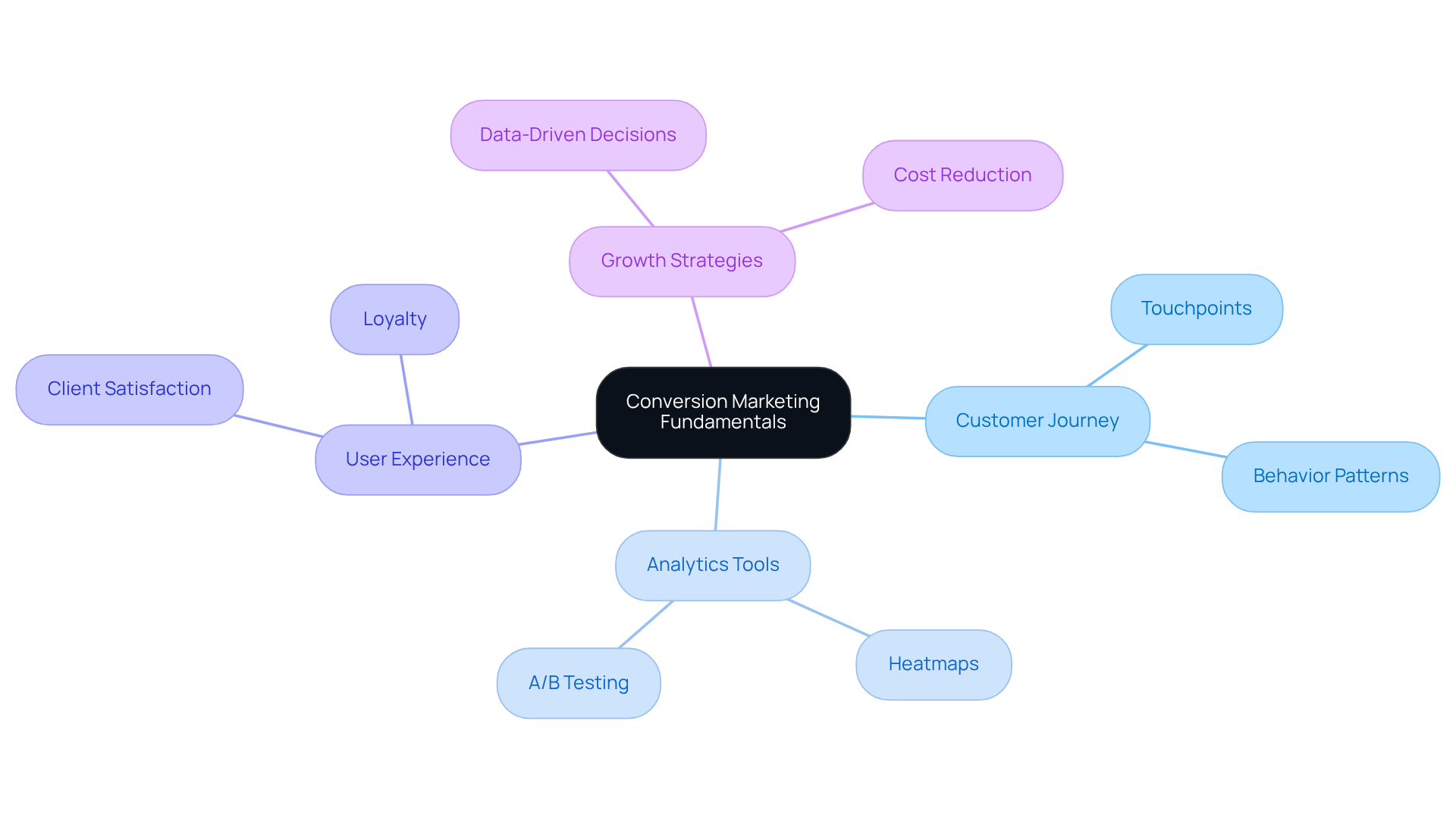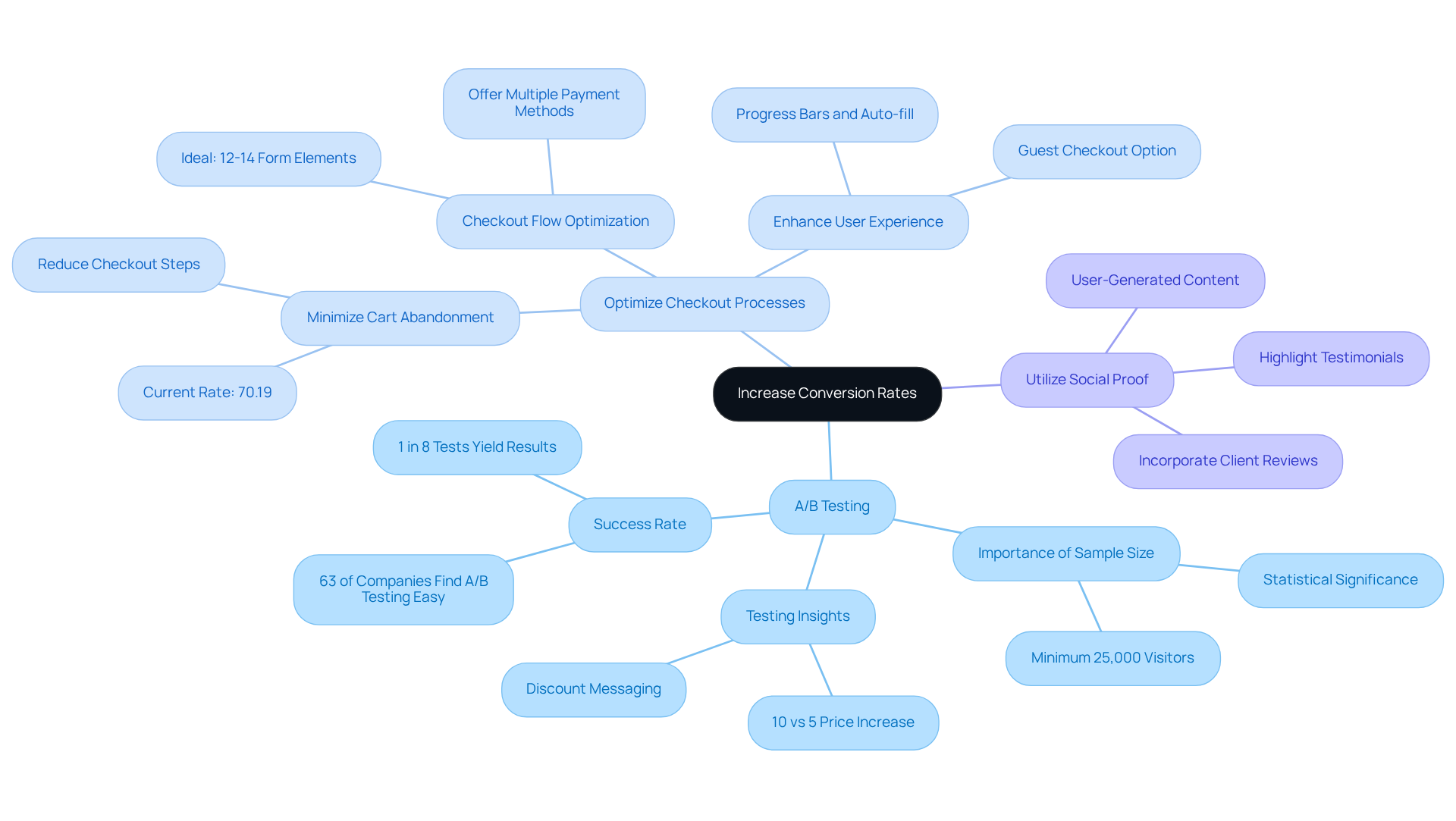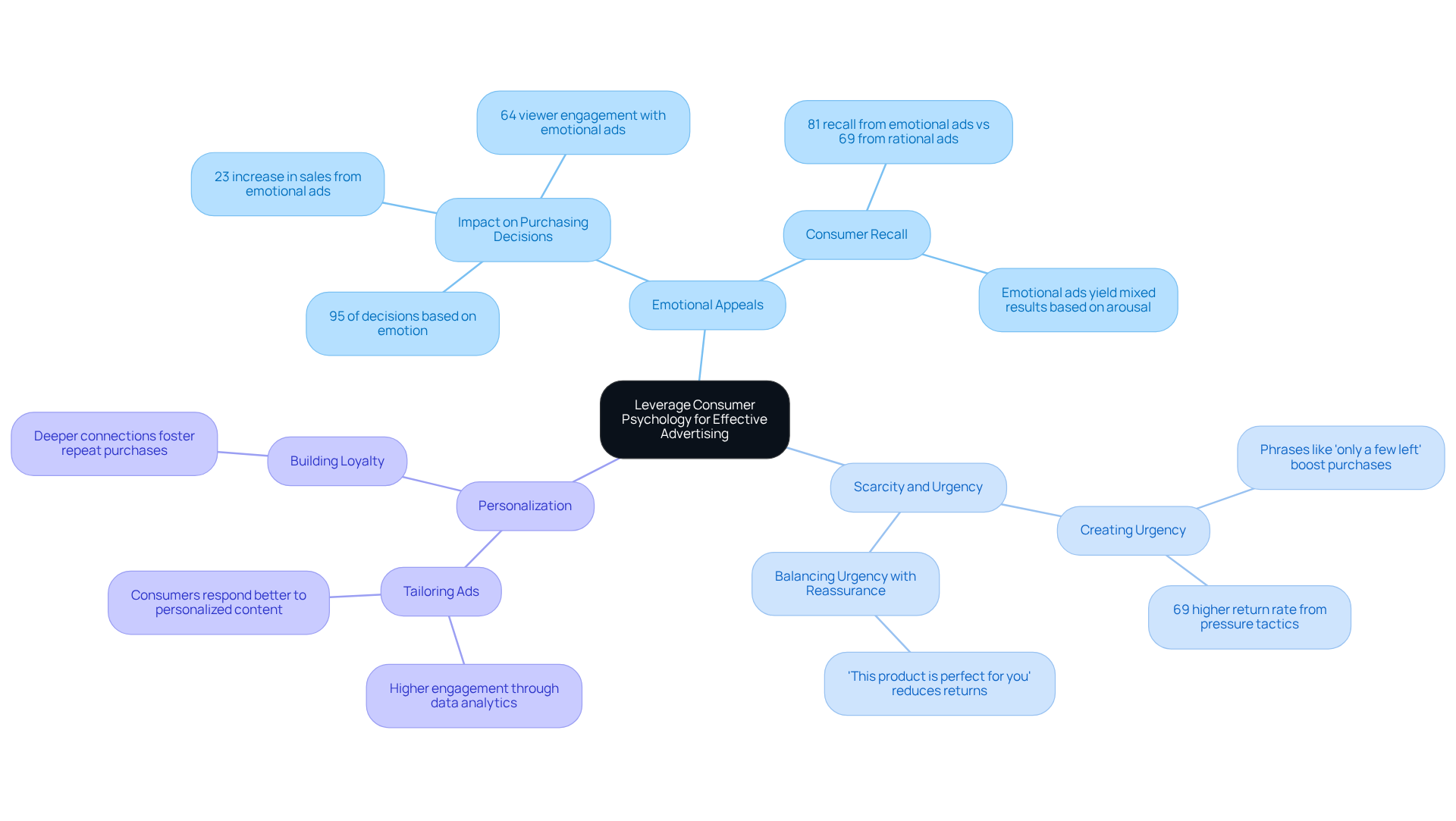
Overview
Effective conversion advertising is crucial for direct-to-consumer (DTC) brands looking to thrive in a competitive landscape. This article presents three proven strategies that can significantly enhance conversion rates:
- A/B testing
- Optimizing checkout processes
- Leveraging social proof
By implementing these strategies, brands can refine their marketing tactics and create a seamless customer experience.
First, A/B testing allows brands to experiment with different advertising approaches, providing data-driven insights that reveal what resonates best with consumers. This method not only captures attention but also builds interest by showcasing the effectiveness of tailored marketing efforts.
Next, optimizing checkout processes is essential. A streamlined checkout experience reduces cart abandonment rates and encourages customers to complete their purchases. By focusing on this critical touchpoint, brands can generate desire and prompt action, ultimately leading to increased sales.
Finally, leveraging social proof—such as customer reviews and testimonials—establishes credibility and trust. When potential buyers see that others have had positive experiences, they are more likely to convert. This strategy effectively reinforces the message that a brand is reliable and worth investing in.
In conclusion, DTC brands can significantly enhance their conversion rates by adopting these strategies. By refining their marketing tactics and focusing on customer experience, they can not only attract but also retain loyal customers. It's time for brands to take action and implement these insights for measurable results.
Introduction
In today’s fiercely competitive digital landscape, direct-to-consumer (DTC) brands confront a critical challenge: turning casual website visitors into loyal customers. Effective conversion advertising isn’t just an option; it’s a necessity. This approach empowers brands to refine their marketing strategies and significantly boost revenue. But with a myriad of tactics available, what truly distinguishes successful DTC brands from their competitors?
This article explores three proven strategies that can elevate conversion rates. By leveraging insights from consumer psychology and data-driven tactics, these strategies not only foster growth but also cultivate lasting customer loyalty. Prepare to discover actionable insights that can transform your approach and drive your brand’s success.
Understand Conversion Marketing Fundamentals
Conversion advertising is pivotal in transforming website visitors into clients by enhancing various aspects of the marketing funnel. Understanding the customer journey, recognizing achievement objectives, and analyzing behavior patterns are essential elements in this process. Brands must prioritize crafting a seamless customer experience, ensuring that every touchpoint is meticulously designed to facilitate transactions.
Employing analytics tools like heatmaps and A/B testing is crucial for monitoring interactions and gathering data that informs decision-making. For instance, utilizing session recordings can reveal obstacles in the consumer journey, allowing companies to implement data-driven modifications that enhance the overall experience and increase success rates. A well-optimized experience can boost conversion rates by as much as 400%. Moreover, for every $1 invested in user experience (UX), companies can expect a return of up to $100.
As Frosina Stojchevska emphasizes, investing in user experience not only elevates client satisfaction but also fosters loyalty, making it a strategic necessity for DTC companies aiming for sustained growth. At Parah Group, we specialize in conversion advertising with an emphasis on profitability and sustainable growth. Our senior-level team, experienced on both the product and agency sides, understands the key metrics that matter to you and your investors.
By tailoring our strategies to your unique needs, we empower you to make data-driven decisions that directly contribute to your business growth while effectively reducing customer acquisition costs.

Implement Proven Methods to Increase Conversion Rates
To effectively increase conversion rates, DTC brands must adopt several proven strategies:
-
A/B Testing: Regularly testing different versions of landing pages, ad creatives, and calls-to-action (CTAs) is essential. This data-driven approach allows brands to refine their strategies for conversion advertising based on actual consumer behavior. Research indicates that approximately one in eight A/B tests yields significant results. Achieving statistical significance by reaching a sample size of at least 25,000 visitors can provide more reliable insights.
-
Optimize Checkout Processes: Streamlining the checkout process is crucial for minimizing cart abandonment rates, which hover around 70.19%. Brands should strive to reduce the number of steps needed to complete a purchase, ideally cutting the average checkout flow from 23.48 form elements to a more efficient 12-14. Offering various payment methods and enabling guest checkout can cater to diverse customer preferences, significantly enhancing the user experience.
-
Utilize Social Proof: Incorporating client reviews, testimonials, and user-generated content fosters trust and encourages potential buyers to make a purchase. Highlighting positive experiences from current clients can effectively influence new visitors, as trust has become a cornerstone of marketing success. Brands that cultivate trust quickly can lower rising customer acquisition costs and boost overall success rates with effective conversion advertising.

Leverage Consumer Psychology for Effective Advertising
To create effective advertising that drives conversions, DTC brands must leverage key principles of consumer psychology:
-
Emotional Appeals: Ads that evoke emotions are not just memorable; they are impactful. Research shows that a staggering 95% of purchasing decisions hinge on emotional factors. This underscores the necessity for brands to identify and elicit specific emotions—such as happiness, nostalgia, or urgency—in their messaging. Emotional ads can lead to a remarkable 23% increase in sales, and 64% of viewers engage fully with ads that resonate emotionally. This demonstrates their profound effectiveness in influencing consumer behavior.
-
Scarcity and Urgency: Highlighting limited-time offers or low stock levels creates a compelling sense of urgency that encourages immediate action. Phrases like 'only a few left' or 'sale ends soon' effectively motivate consumers to make quicker purchasing decisions. Studies indicate that pressure tactics can boost purchases, yet they may also lead to a 69% higher return rate. Therefore, balancing urgency with reassurance—such as stating 'this product is ideal for you'—can enhance customer satisfaction while driving sales.
-
Personalization: Tailoring ads to individual preferences and behaviors significantly enhances engagement. By utilizing data analytics to segment audiences and deliver personalized content, brands can achieve higher conversion advertising rates. Consumers are more likely to respond to messages that resonate with their specific needs and interests. Brands that effectively implement personalized strategies foster deeper connections with their audience, ultimately driving loyalty and repeat purchases.

Conclusion
Effective conversion advertising is crucial for direct-to-consumer (DTC) brands aiming to transform potential customers into loyal clients. By honing in on the nuances of the customer journey and optimizing every interaction, brands can significantly boost their conversion rates and overall profitability. Understanding consumer behavior and leveraging data-driven insights are essential for crafting a seamless and engaging shopping experience.
Key strategies like A/B testing, optimizing checkout processes, and utilizing social proof are vital in maximizing conversion rates. By continuously refining marketing tactics based on real consumer interactions, DTC brands can minimize cart abandonment and cultivate trust through authentic customer testimonials. Moreover, tapping into consumer psychology—through emotional appeals, urgency, and personalization—can further amplify advertising effectiveness, fostering deeper connections with potential customers.
The importance of these insights cannot be overstated. As DTC brands navigate an increasingly competitive landscape, adopting these proven strategies will not only enhance conversion rates but also nurture long-term customer loyalty. By prioritizing user experience and integrating psychological principles into advertising efforts, brands can develop compelling campaigns that resonate with their audience, ultimately paving the way for sustainable growth and success in the marketplace.
Frequently Asked Questions
What is conversion advertising?
Conversion advertising is a marketing strategy aimed at transforming website visitors into clients by enhancing various aspects of the marketing funnel.
Why is understanding the customer journey important in conversion marketing?
Understanding the customer journey is essential for recognizing achievement objectives and analyzing behavior patterns, which helps in crafting a seamless customer experience.
What tools are recommended for monitoring interactions in conversion marketing?
Analytics tools such as heatmaps, A/B testing, and session recordings are recommended for monitoring interactions and gathering data to inform decision-making.
How can session recordings help businesses?
Session recordings can reveal obstacles in the consumer journey, allowing companies to implement data-driven modifications that enhance the overall experience and increase success rates.
What impact can a well-optimized customer experience have on conversion rates?
A well-optimized experience can boost conversion rates by as much as 400%.
What is the return on investment for user experience (UX) spending?
For every $1 invested in user experience (UX), companies can expect a return of up to $100.
How does investing in user experience affect client satisfaction?
Investing in user experience elevates client satisfaction and fosters loyalty, making it a strategic necessity for companies aiming for sustained growth.
What does Parah Group specialize in?
Parah Group specializes in conversion advertising with an emphasis on profitability and sustainable growth.
How does Parah Group support businesses in their growth?
Parah Group tailors strategies to unique needs, empowering businesses to make data-driven decisions that contribute to growth while effectively reducing customer acquisition costs.
FAQs











